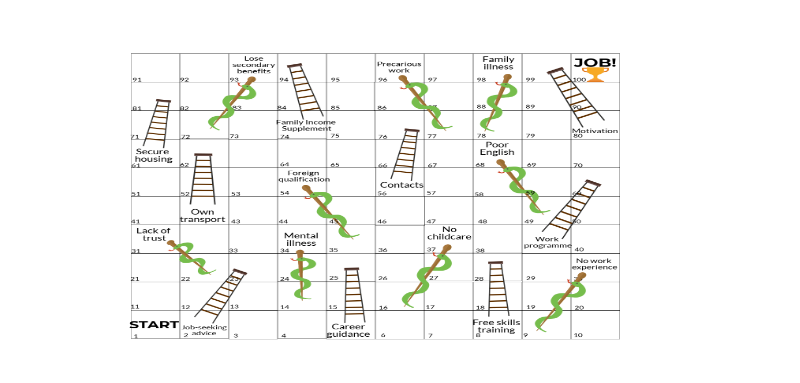You are here: Home > News & Events > NESC publishes Council Report 146: Moving from Welfare to Work: Low Work Intensity Households and the Quality of Support Services
NESC publishes Council Report 146: Moving from Welfare to Work: Low Work Intensity Households and the Quality of Support Services
- 20 June 2018
- Types: Press Releases

MEDIA RELEASE
‘Focus on households needed to tackle joblessness’
Today’s report from the National Economic and Social Council (NESC), Moving from Welfare to Work, finds that Ireland’s social welfare and employment support system, e.g. Intreo does reasonably well in supporting people into paid work, but there is a need to have a greater focus on the household. This means encouraging and supporting into jobs partners of people who are unemployed, lone parents, people with a disability and their carers who wish to enter employment.
One of the report’s authors, Dr Helen Johnston, said that ‘in Ireland the proportion of households where no-one is working or where there is only marginal attachment to the labour force is higher than in most other European countries. We wanted to find out why this was the case and to understand the barriers to employment faced by people in these ‘low work intensity’ households’.
The research found that there is a diversity of low work intensity households: unemployed people, lone parents, people with an illness or disability, and ethnic minorities. They avail of a range of income support payment schemes. Most had labour market experience, but low levels of education, and almost all had the ambition to improve their lives and the lives of their children.
Co-author, Dr Anne-Marie McGauran, said that co-ordination is required between service providers, such as Intreo, the education and training boards, and employers. In addition, Dr McGauran stated that ”the intensity of the support available needs to increase, especially for those most distant from the labour market, such as those with literacy difficulties or poor English. There is also a need to build trust through better engagement with service users.”
The conclusions of the report point to the need for:
- engagement with people who are not in paid work and are not on the Live Register;
- adequate time for case officers to engage with clients;
- supports that meet the needs of those most distant from the labour market;
- more affordable childcare, particularly after-school care;
- more public housing, and additional affordable private housing;
- improved career guidance;
- stronger links between training agencies and the labour market;
- measures that provide more certainty for people with children who are moving from welfare into employment;
- greater engagement with employers; and
- actions to reduce uncertain hours of work.
Note to Editors
This report is based on 92 interviews with low work intensity households, service provider organisations, employers, senior officials in government departments and agencies, and national stakeholder organisations, in a disadvantaged suburb of Dublin, in 2016 and 2017.
The research was undertaken by staff at the National Economic and Social Council (NESC). The NESC, established in 1973, is an expert advisory and consultative body, focusing on strategic economic, social and environmental policies. It analyses and reports to the Taoiseach on challenging policy issues and addresses the public system and the institutional challenges related to implementation, monitoring and learning. It is chaired by the Secretary General of the Department of the Taoiseach. The members of the Council are appointed by the Taoiseach, for a three year term. They are representatives of business and employers’ organisations, trade unions, agricultural and farming organisations, community and voluntary sector organisations, and environmental organisations; as well as heads of Government departments and independent experts. The Council has published 146 agreed reports on a wide range of policy issues, as well as research papers by its professional Secretariat and other experts.
The report published today summarises the main points from a full research report Low Work Intensity Households and the Quality of Supportive Services: Research Findings, which is available on NESC’s website at www.nesc.ie.
For further information, for a copy of the report or to arrange an interview, please contact the report’s authors Dr Helen Johnston, helen.johnston@nesc.ie or Dr Anne-Marie McGauran, am.mcgauran@nesc.ie, or phone 018146300.
To view the full report click here
To view the executive summary click here
To view the research report click here
![]()
Follow this #NescJoblessHouseholds
Follow us @nescireland


